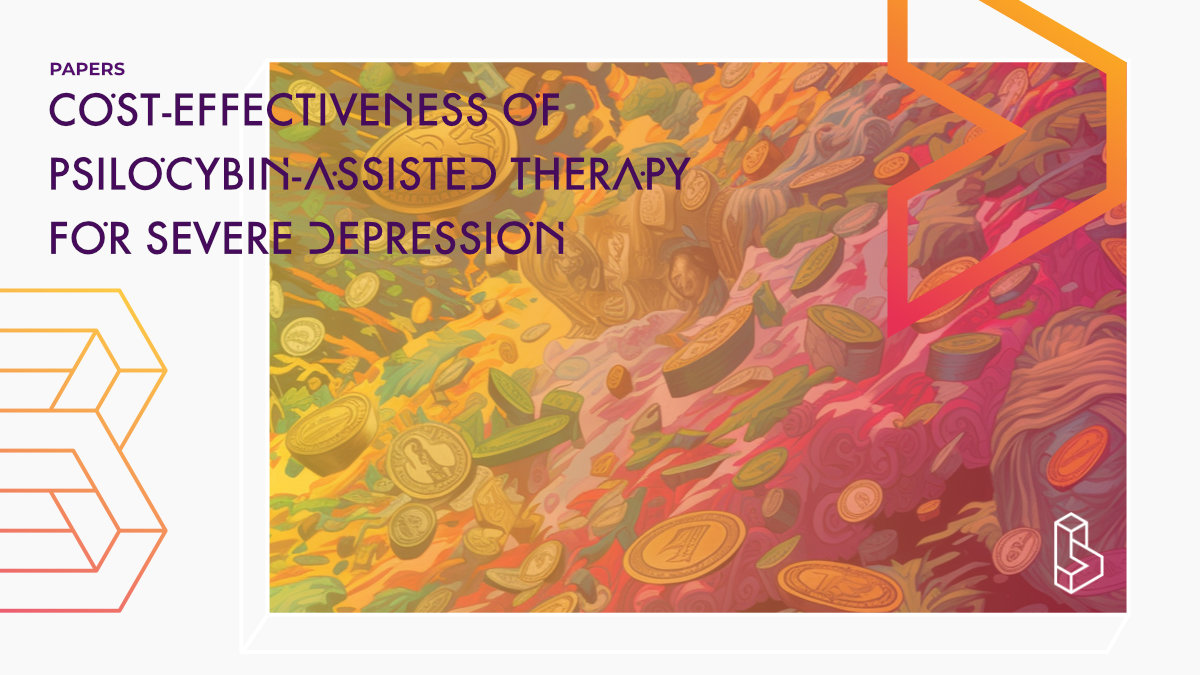This study assesses the cost-effectiveness of psilocybin-assisted psychotherapy (PAP/PAT) versus conventional medication, cognitive behavioural therapy (CBT), and the combination of the two for difficult-to-treat depression (in the UK). The decision model simulates patient outcomes (response, remission, and relapse) and analyzes costs and quality-adjusted life years (QALYs) over a 6-month period. PAT was not cost-effective unless therapists’ (and drug) prices declined.
Abstract of Cost-effectiveness of PAT for severe depression
“Background: There is growing evidence to support the use of the psychedelic drug psilocybin for difficult-to-treat depression. This paper compares the cost-effectiveness of psilocybin-assisted psychotherapy (PAP) with conventional medication, cognitive behavioural therapy (CBT), and the combination of conventional medication and CBT.
Methods: A decision model simulated patient events (response, remission, and relapse) following treatment. Data on probabilities, costs and quality-adjusted life years (QALYs) were derived from previous studies or from best estimates. Expected healthcare and societal costs and QALYs over a 6-month time period were calculated. Sensitivity analyses were used to address uncertainty in parameter estimates.
Results: The expected healthcare cost of PAP varied from £6132 to £7652 depending on the price of psilocybin. This compares to £3528 for conventional medication alone, £4250 for CBT alone, and £4197 for their combination. QALYs were highest for psilocybin (0.310), followed by CBT alone (0.283), conventional medication alone (0.278), and their combination (0.287). Psilocybin was shown to be cost-effective compared to the other therapies when the cost of therapist support was reduced by 50% and the psilocybin price was reduced from its initial value to £400 to £800 per person. From a societal perspective, psilocybin had improved cost-effectiveness compared to a healthcare perspective.
Conclusions: Psilocybin has the potential to be a cost-effective therapy for severe depression. This depends on the level of psychological support that is given to patients receiving psilocybin and the price of the drug itself. Further data on long-term outcomes are required to improve the evidence base.”
Authors: Paul McCrone, Henry Fisher, Clare Knight, Rebecca Harding, Anne K. Schlag, David J. Nutt & Joanna C. Neill
Summary of Cost-effectiveness of psilocybin-assisted therapy for severe depression
Major depressive disorder (MDD) is common and results in substantial disease and economic burden. There are established treatment options for many with MDD, but the effectiveness of therapeutic options for treatment-resistant depression (TRD) is more limited.
Recently, several studies have evaluated the efficacy of psilocybin-assisted therapy (PAP/PAT) in treating moderate to severe depression, including patients with comorbid conditions such as cancer, AIDS, eating disorders and substance abuse.
Studies on PAP have generally been small, with limited follow-up, and the average session lasts five hours with two ‘guides’. However, results have tended to be positive, and efficacy persists beyond these sessions.
Find this paper
https://doi.org/10.1017/S0033291723001411
Open Access | Google Scholar | Backup | 🕊
Cite this paper (APA)
McCrone, P., Fisher, H., Knight, C., Harding, R., Schlag, A. K., Nutt, D. J., & Neill, J. C. (2023). Cost-effectiveness of psilocybin-assisted therapy for severe depression: exploratory findings from a decision analytic model. Psychological Medicine, 1-8.
Study details
Compounds studied
Psilocybin
Topics studied
Economics
Study characteristics
Commentary
Theory Building
Authors
Authors associated with this publication with profiles on Blossom
David NuttDavid John Nutt is a great advocate for looking at drugs and their harm objectively and scientifically. This got him dismissed as ACMD (Advisory Council on the Misuse of Drugs) chairman.
Institutes
Institutes associated with this publication
Clerkenwell HealthClerkenwell is a clinical research organisation (CRO) in the UK that supports drug developers as they attempt to commercialise psychedelic therapies. Clerkenwell offers support from preclinical studies up to Phase III of the drug development process.

